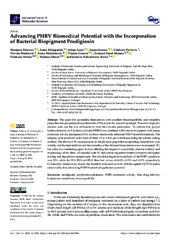Приказ основних података о документу
Advancing PHBV Biomedical Potential with the Incorporation of Bacterial Biopigment Prodigiosin
| dc.creator | Ponjavić, Marijana | |
| dc.creator | Malagurski, Ivana | |
| dc.creator | Lazić, Jelena | |
| dc.creator | Jeremić, Sanja | |
| dc.creator | Pavlović, Vladimir | |
| dc.creator | Prlainović, Nevena | |
| dc.creator | Maksimović, Vesna | |
| dc.creator | Ćosović, Vladan | |
| dc.creator | Atanase, Leonard Ionut | |
| dc.date.accessioned | 2023-02-15T21:42:00Z | |
| dc.date.accessioned | 2023-02-23T12:02:00Z | |
| dc.date.available | 2023-02-15T21:42:00Z | |
| dc.date.available | 2023-02-23T12:02:00Z | |
| dc.date.issued | 2023 | |
| dc.identifier.issn | 1422-0067 | |
| dc.identifier.uri | http://TechnoRep.tmf.bg.ac.rs/handle/123456789/5866 | |
| dc.description.abstract | The quest for sustainable biomaterials with excellent biocompatibility and tailorableproperties has put polyhydroxyalkanoates (PHAs) into the research spotlight. However, high productioncosts and the lack of bioactivity limit their market penetration. To address this, poly(3-hydroxybutyrate-co-3-hydroxyvalerate) (PHBV) was combined with a bacterial pigment with stronganticancer activity, prodigiosin (PG), to obtain functionally enhanced PHBV-based biomaterials. Thesamples were produced in the form of films 115.6–118.8 m in thickness using the solvent castingmethod. The effects of PG incorporation on the physical properties (morphology, biopolymer crystallinityand thermal stability) and functionality of the obtained biomaterials were investigated. PGhas acted as a nucleating agent, in turn affecting the degree of crystallinity, thermal stability andmorphology of the films. All samples with PG had a more organized internal structure and highermelting and degradation temperatures. The calculated degree of crystallinity of the PHBV copolymerwas 53%, while the PG1, PG3 and PG3 films had values of 64.0%, 63.9% and 69.2%, respectively.Cytotoxicity studies have shown the excellent anticancer activity of films against HCT116 (coloncancer) cells, thus advancing PHBV biomedical application potential. | sr |
| dc.language.iso | en | sr |
| dc.publisher | Switzerland : Multidisciplinary Digital Publishing Institute (MDPI) | sr |
| dc.relation | info:eu-repo/grantAgreement/MESTD/inst-2020/200042/RS// | sr |
| dc.relation | info:eu-repo/grantAgreement/ScienceFundRS/Ideje/7730810/RS// | sr |
| dc.relation | Project LA/P/0140/202019 of the Associate Laboratory Institute for Health and Bioeconomy—i4HB | sr |
| dc.relation | The national funds from FCT—Fundação para a Ciência e a Tecnologia, in the scope of the project UIDP/04378/2020 and UIDB/04378/2020 of the Research Unit on Applied Molecular Biosciences—UCIBIO | sr |
| dc.rights | openAccess | sr |
| dc.rights.uri | https://creativecommons.org/licenses/by/4.0/ | |
| dc.source | International Journal of Molecular Sciences | sr |
| dc.subject | prodigiosin | sr |
| dc.subject | polyhydroxyalkanoate | sr |
| dc.subject | PHBV | sr |
| dc.subject | anticancer activity | sr |
| dc.subject | film | sr |
| dc.subject | drug delivery | sr |
| dc.subject | biopolymer crystallinity | sr |
| dc.subject | biocompatibility | sr |
| dc.title | Advancing PHBV Biomedical Potential with the Incorporation of Bacterial Biopigment Prodigiosin | sr |
| dc.type | article | sr |
| dc.rights.license | BY | sr |
| dc.citation.rank | M21~ | |
| dc.citation.spage | 1906 | |
| dc.citation.volume | 24 | |
| dc.identifier.doi | 10.3390/ijms24031906 | |
| dc.identifier.fulltext | http://TechnoRep.tmf.bg.ac.rs/bitstream/id/15535/Advancing_PHBV_Biomedical_pub_2023.pdf | |
| dc.identifier.scopus | 2-s2.0-85147897603 | |
| dc.type.version | publishedVersion | sr |

